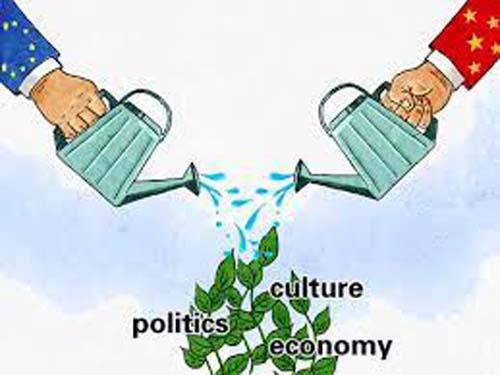
For mutual trust to be regained, the US and China need to communicate openly
Zheng Yongnian
While hostile sentiment against China grows in the US, there is also growing antipathy toward the US among the Chinese general public. This is true, especially on social media, where nationalist sentiment is somewhat elevated among some Chinese people. However, generally speaking, such sentiment is not strong among Chinese people. If we discuss this topic with business people, their attitudes are not quite the same.
Even after former US president Donald Trump launched a trade war against China, the Chinese business community has continued to do business with the US, at times having to go through ASEAN countries or even South American countries. Therefore, so far, trade between China and the US, direct or indirect, is still going on.
Of course, it is undeniable that some American public intellectuals who take a hawkish stance toward China have shown a nationalistic attitude. In fact, there are similar people among the Chinese public intellectuals. But when we talk about nationalist sentiment, its existence depends on which social sphere we are observing.
In social media, there is indeed a proliferation of nationalist sentiment; but in other areas, especially within the Chinese government, I don’t think there is a very strong nationalist sentiment. I have not seen Chinese officials accuse the US in the way that some US members of Congress have publicly accused China. Chinese leaders are also very rational about the US and they want the relationship between the two countries to keep developing in a stable manner.

According to my decades-long observation of nationalism in China, the Chinese government has been able to control nationalist sentiments at home relatively well. For this reason, I’m not that much of a pessimist in this area. I believe what we see now is the result of the high-profile hawkish public intellectuals on one side demonizing the other side.
Many people nowadays are talking about the strategic competitive relationship between China and the US, without even knowing what kind of competition it is. In my view, there is good and bad competition in a competitive relationship.
On the one hand, there is, for example, competition in the economy and technology. Such competition is both inevitable and, in all probability, beneficial, because healthy competition in these aspects will actually promote the development of both sides. In terms of chips, the US stopped exporting cutting-edge process chips to China. However, having made great efforts, progress has been achieved with chips designed and made in China.
On the other hand, there is institutional or political competition. For example, the so-called democracy versus autocracy that some politicians push for is evolving into a kind of competition in terms of ideology. But we have nothing to fear from this kind of competition, because China has a unique political system, which is closely linked to its historical tradition and culture.
What we should be worried about is the arms race, which is the worst kind of competition.
My years of experience working in the ASEAN countries told me that they and nations in many similar regions welcome economic competition between Beijing and Washington, and they are not worried about competition in other areas. However, they are concerned about the arms race – for instance, the one between China and the US will cause a lot of problems for these regions.
Personally, I think that China and the US must look at such a position from ASEAN very carefully. ASEAN in recent years has made a collective decision of refusing to take sides. The atmosphere in the global arena now is completely different from that of the Cold War when the US and the Soviet Union were at Cold War and small countries had to take sides.
What we need is political mutual trust. People have much confidence that business and economic cooperation between China and the US will still develop. But we need more mutual trust on the political front. Several US high-level government officials have in recent months visited China. If the two countries begin to engage in political dialogues, both societies can move further toward mutual trust.
Nationalistic sentiments appear because the people of China and the US have lost confidence in each other now due to a lack of communication between the two sides. Therefore, we hope that the two countries can communicate candidly.
The China-US relationship is very important. It is not a simple bilateral relationship, as both countries are the two pillars of the world order. The US can’t maintain the global order without China, and China can’t establish one without the US. As part of civil society, we should make every effort to put China-US relations back on track.
The writer is a professor at the Chinese University of Hong Kong, Shenzhen and president of The Institute for International Affairs, Qianhai
